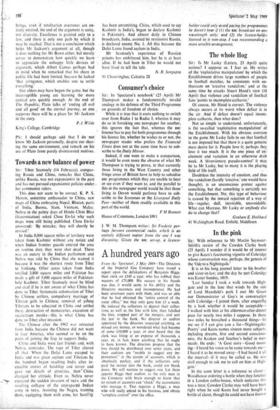Consumer's choice
Sir: In 'Spectator's notebook' (25 April) Mr Thompson makes a fundamentally invalid analogy in his defence of the Third Programme on grounds of freedom of choice.
While it is true that it costs nothing to switch over from Radio 1 to Radio 3, whereas it may do so in forsaking one newspaper for another, this ignores the fact that, whereas the BBC listener has to pay for both programmes through his licence fee, whether he wishes to or not, the newspaper reader who prefers the Financial Times does not at the same time have to sub- scribe to the Daily Mirror.
Indeed, if one were to make a comparison, it would be even more the obverse of what Mr Thompson is trying to prove, in that currently those living in the West Country and other fringe areas of Britain have to help to subsidise BBC programmes which they are unable to hear or see even if they want to, and the parallel to this in the newspaper world would be that those living in Devon would perforce have to sub- scribe to the Scotsman or the Liverpool Daily Post—neither of them readily available in this part of the world.
J. W. M. Thompson writes : Sir Frederic per- haps favours commercial radio, which is an entirely different matter from the one I was discussing. Given the BBC set-up, a licence- holder could only avoid paying for progranilnes he doesn't hear if (I) the BBC broadcast on one wavelength only; and (2) the licence-holder listened to it non-stop. I was recommending a more sensible arrangement.


































 Previous page
Previous page